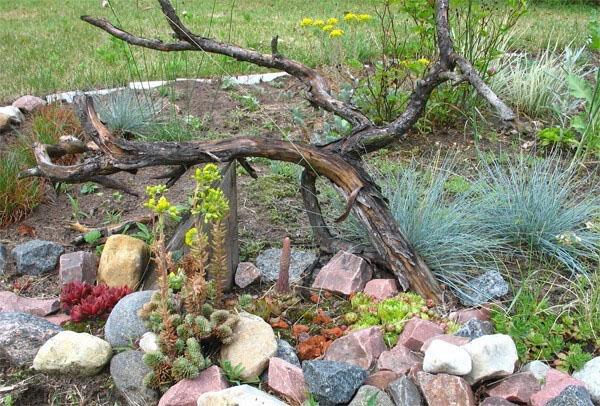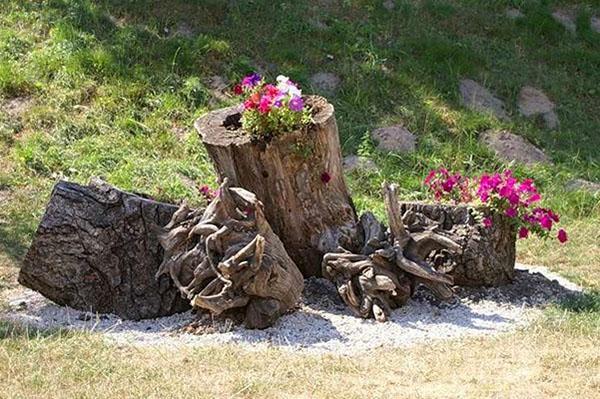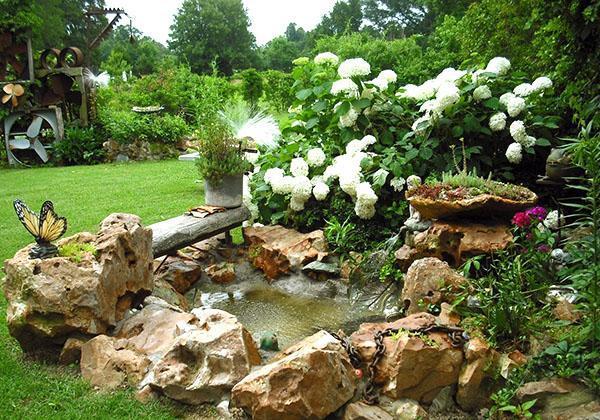Amazing Rutaria - Root Garden on Your Site
 The concept of "rutary" comes from the English word "root", meaning "root". This is a man-made ensemble consisting of tree roots, stumps, stones and trunks. The composition is complemented by various plants and unusual objects. This modern and trendy idea can be the jewel in your garden. Decorated with flowers and vines of green plants, the "Root Garden" is a true achievement of a skilled designer.
The concept of "rutary" comes from the English word "root", meaning "root". This is a man-made ensemble consisting of tree roots, stumps, stones and trunks. The composition is complemented by various plants and unusual objects. This modern and trendy idea can be the jewel in your garden. Decorated with flowers and vines of green plants, the "Root Garden" is a true achievement of a skilled designer.
Where better to organize the composition
The first step to creating your own root garden is to choose a location. Do you have an old tree stump on site? A rutaria can be created around it using the stump as a center.

 A body of water would also be an ideal place. Being near the water is soothing, and the beautiful design of the shore with lilies and hemp decor will always delight the eye.
A body of water would also be an ideal place. Being near the water is soothing, and the beautiful design of the shore with lilies and hemp decor will always delight the eye.
Preparing materials
 The next step will be the procurement of materials. First, look around. Often a lot can be found right on your site. Old driftwood, stones and branches will do. The rest you can easily find in the nearby forest and by the stream. Send the children to collect interesting stones. Size in this case does not matter, everything will depend only on your imagination.
The next step will be the procurement of materials. First, look around. Often a lot can be found right on your site. Old driftwood, stones and branches will do. The rest you can easily find in the nearby forest and by the stream. Send the children to collect interesting stones. Size in this case does not matter, everything will depend only on your imagination.
Do not throw out the broken off tree bark, it will serve as a decor for the future rutaria.
Be sure to add colored bottles, decorative figures of gnomes, tires and any unusual but creative things to the branches and stones.
 An integral part of rutaria will be short plants, dwarf shrubs, moss and undersized flowers. You can plant blueberries and strawberries, their planting will look harmonious in the overall composition.
An integral part of rutaria will be short plants, dwarf shrubs, moss and undersized flowers. You can plant blueberries and strawberries, their planting will look harmonious in the overall composition.
The average lifespan of a rutaria is about 3 years.
Wood and stone processing
 All wooden parts must be doused with boiling water to destroy the larvae in the crevices. Then the tree should be dried and treated with a composition from bark beetles and decay. It is best to use colorless preparations so as not to spoil the natural appearance of the material.
All wooden parts must be doused with boiling water to destroy the larvae in the crevices. Then the tree should be dried and treated with a composition from bark beetles and decay. It is best to use colorless preparations so as not to spoil the natural appearance of the material.
If we are talking about a composition with a stump in the center, then the space around it will need to be cleared of weeds and debris, and the dust in the middle should be removed to the maximum. Don't touch the moss - it's a beautiful groundcover that looks good in rutaria.
 Things are easier with stones. It is enough to select them by size, wash well and clean them from vegetation residues. You can paint or varnish them and overlay them in the center of the composition. Or you can sit figurines of fairy-tale characters on the stones, creating a play corner for children.
Things are easier with stones. It is enough to select them by size, wash well and clean them from vegetation residues. You can paint or varnish them and overlay them in the center of the composition. Or you can sit figurines of fairy-tale characters on the stones, creating a play corner for children.
Layout
 Make a drawing and sketches of the future rutaria. To do this, you can use special online services, or just draw a plan on paper. Take your time and consistently sketch all the elements, starting from the center and moving to the edges.
Make a drawing and sketches of the future rutaria. To do this, you can use special online services, or just draw a plan on paper. Take your time and consistently sketch all the elements, starting from the center and moving to the edges.
 Consider the growth characteristics and dependence on the sun's rays of those plants that are going to plant. After the sketches are completed, take another look at the selected location and surroundings.If everything suits you, then you can proceed to the stage of creating a composition.
Consider the growth characteristics and dependence on the sun's rays of those plants that are going to plant. After the sketches are completed, take another look at the selected location and surroundings.If everything suits you, then you can proceed to the stage of creating a composition.
Rutaria creation
 Place the largest items first. Based on the prepared plan, lay out the driftwood and stones. A little space should be left between them so that you can go through for cleaning and adjusting the landscape.
Place the largest items first. Based on the prepared plan, lay out the driftwood and stones. A little space should be left between them so that you can go through for cleaning and adjusting the landscape.
When installing vertical elements, keep in mind that poles and poles should be reliably dug into the ground so that they do not stagger.
Now it's time to decorate. Show your imagination, there are no restrictions here. Figurines and place the figurines among the large components. Come up with a single plot and bring it to life. For example, you can put a gnome to guard the entrance to the garden, and put birds carved from tires behind him.
We plant plants
 When the environment is ready, we plant the plants. A hollow should have formed in the center of the stump, where you previously removed the old dust. Pour the soil into it with a mixture of fertilizers and sow. You can plant ivy and fern, and between them - asters and cornflowers. Just study in advance which plants are not recommended to keep nearby.
When the environment is ready, we plant the plants. A hollow should have formed in the center of the stump, where you previously removed the old dust. Pour the soil into it with a mixture of fertilizers and sow. You can plant ivy and fern, and between them - asters and cornflowers. Just study in advance which plants are not recommended to keep nearby.
 We plant the space among large branches and snags with dwarf coniferous varieties. You can place bright flowers in the hollows.
We plant the space among large branches and snags with dwarf coniferous varieties. You can place bright flowers in the hollows.
Making borders
The territory of rutaria must be limited. This is done with stones or bottles in a line. We recommend alternating colors, then the border will be more interesting.
 Don't be afraid to make adjustments to your plan and experiment. For example, it will be nice to cover free areas with gravel or pebbles.
Don't be afraid to make adjustments to your plan and experiment. For example, it will be nice to cover free areas with gravel or pebbles.
It should be understood that wooden elements will rot and crumble over the course of several years, so they will have to be replaced in any case. Apart from caring for plants and cleaning up the trash, taking care of the rutaria shouldn't take much of your time.